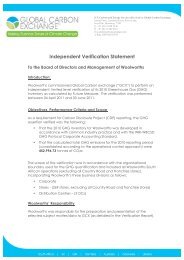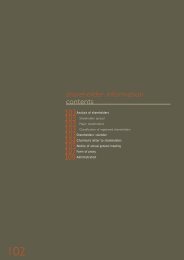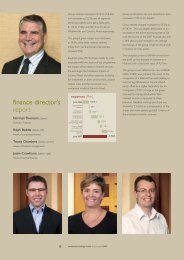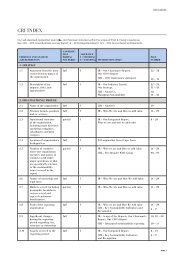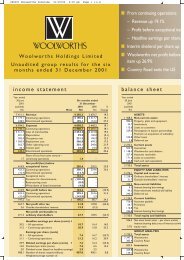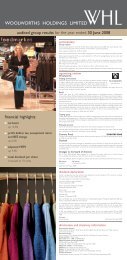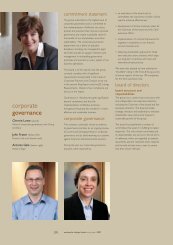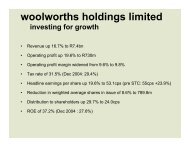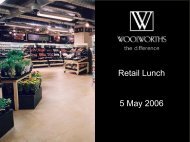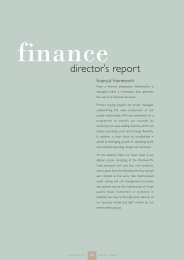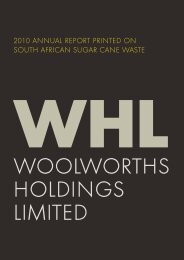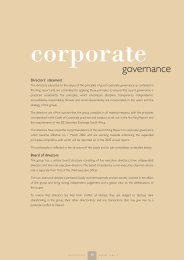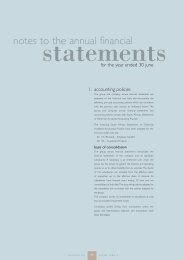WoolWorths holdings limited 2013 good BUsiness JoUrneY report
WoolWorths holdings limited 2013 good BUsiness JoUrneY report
WoolWorths holdings limited 2013 good BUsiness JoUrneY report
You also want an ePaper? Increase the reach of your titles
YUMPU automatically turns print PDFs into web optimized ePapers that Google loves.
Environment<br />
PLASTIC BAG USAGE<br />
AND REUSABLE BAGS<br />
Woolworths is committed to reducing<br />
plastic bag usage as a way of reducing<br />
its impact on the environment, saving<br />
costs and assisting customers to save<br />
costs as well. Woolworths customers are<br />
particularly encouraged to use reusable<br />
shopping bags, thereby reducing the<br />
number of new shopping bags that<br />
need to be made.<br />
These have created an opportunity for<br />
Woolworths to preserve the environment<br />
as well as support enterprise development.<br />
Woolworths’ two main reusable bag<br />
suppliers, Isikhwama, based in Cape<br />
Town, and Gusco, based in Uitenhage,<br />
have sustained 140 jobs since the reusable<br />
bag business began eight years ago.<br />
Isikhwama employ and still recruit from<br />
the local area, semi-skilled and unskilled<br />
people, who were previously out of<br />
work. Gusco, being a cooperative,<br />
have retained the same employees.<br />
Woolworths is the first retailer to start<br />
using post-consumer PET waste (recycled<br />
Polyethylene Terephthalate bottles) to<br />
make the colourful range of fabric reusable<br />
bags. The fabric is made using 80% postconsumer<br />
waste mixed with 20% of a<br />
“low-melt binder” to ensure the bag is<br />
durable enough to carry groceries.<br />
To date, Woolworths has used 121 tonnes<br />
of fibre made from recycled PET bottles<br />
to make the fabric bags. This translates<br />
into 3.5 million bottles recycled and no<br />
longer going to landfill, and reducing<br />
carbon emissions associated with<br />
producing virgin material by 54%. It also<br />
helps create jobs – it’s estimated that<br />
some 10 000 people earn income from<br />
collecting bottles. This would not have<br />
been possible without the support and<br />
close working relationship between<br />
Woolworths, Extrupet and Propet.<br />
Reusable bag sales remain fairly strong<br />
as consumers switch from plastic bags,<br />
with almost 1,46 million bags sold<br />
(1.6 million in 2012), and a number of new<br />
designs launched. Through the designs,<br />
Woolworths aims to raise awareness<br />
around sustainability related issues such<br />
as sustainable fishing, water, sustainable<br />
farming, biodiversity and endangered<br />
wildlife. Some designs specifically raise<br />
funds to aid conservation efforts to help<br />
save Africa’s most endangered species.<br />
Since the launch of the first <strong>limited</strong> edition<br />
rhino bag in 2010, we’ve donated over<br />
R1.2 million to rhino conservation, and<br />
some R1.3 million has gone towards<br />
Cheetah, African painted dog and<br />
Vulture conservation. In <strong>2013</strong> Woolworths<br />
launched the “My Ocean Promise”<br />
range, in partnership with the Two<br />
Oceans Aquarium, shifting the focus to<br />
our threatened marine species. To date,<br />
Woolworth’s customers have helped<br />
raise over R3.6 million for conservation<br />
efforts to save our threatened wildlife<br />
and marine life and these bags have<br />
emphasised and educated consumers<br />
on the facts, highlighting that wherever<br />
we are in South Africa, our behaviour<br />
affects our precious wildlife.<br />
Relative plastic shopping bag usage<br />
has, however, remained stable, with 0.79<br />
achieved during the past year. The 25%<br />
reduction target (of 1.0) had been set for<br />
2012, off a 2007 benchmark of 1.3 plastic<br />
bags per transaction. Woolworths has<br />
targeted to halve the amount of plastic<br />
bags used in foods by 2015 (to 0.5).<br />
Woolworths’ “green carriers” food bags<br />
are made from 55% recycled plastic,<br />
harvested from post-industrial waste.<br />
The shopping bags used for clothing<br />
and general merchandise also contain<br />
55% recycled material which is also<br />
harvested from post-industrial waste.<br />
Woolworths Is currently in the process<br />
of moving to 85% recycled post-consumer<br />
waste in our foods plastic bags.<br />
Plastic Bag usage<br />
120 000<br />
118 942 118 729<br />
100 000<br />
80 000<br />
88 502<br />
76 926<br />
86 104<br />
72 350<br />
60 000<br />
62 140<br />
60 317<br />
40 000<br />
20 000<br />
0<br />
05/06 06/07 07/08 08/09 09/10 10/11 11/12 12/13<br />
<strong>2013</strong> GOOD BUSINESS JOURNEY / WHL 79



